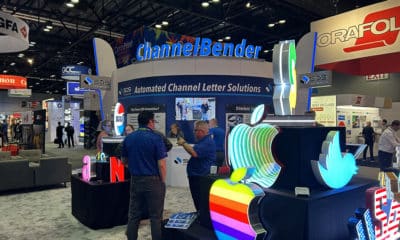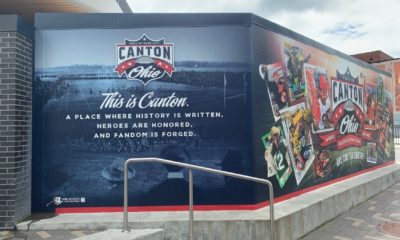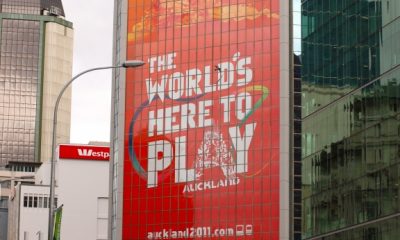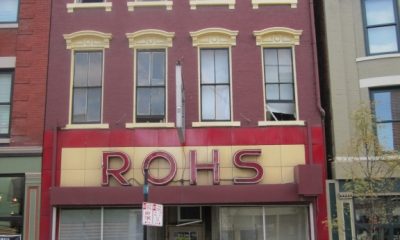You’ve seen their signs atop Lambeau Field (Green Bay Packers), Miller Park (Milwaukee Brewers), Soldier Field (Chicago Bears), the Georgia Aquarium and at such retail stores as Target and Kohl’s nationwide. Perhaps Poblocki Sign Co. (West Allis, WI) has achieved its marquee, sign-industry name because its origins are steeped in movie marquees.
In the ensuing three-quarters of a century, clients from all 50 states in healthcare, sports venues, schools and corporations have received project management, design, fabrication, installation and maintenance of interior, exterior and specialty signage from Poblocki.
In 1932, Ben Poblocki wanted to capitalize on the popularity of “talking pictures.” Despite the throes of the Great Depression, he started Electrolite Signs Inc. When his sons joined him in the business, Ben soon renamed it Poblocki & Sons, and it quickly grew by building custom marquees for each theatre.
Then World War II commanded all steel fabrication. The marqueesign industry skidded to an abrupt halt. Three Poblocki sons enlisted. The enterprising Ben toured some military camps and determined how to contribute. The company began making thousands of theatre chairs; wood supports substituted for cast iron.
Advertisement
After the war, the marquee business again flourished, but, with the advent of television in the mid-’50s, the theatre business slowed considerably. For a short time, the company shifted gears toward metal fabrication while making motor housings for Louis-Allis Co., whose primary clients were the Army and the Navy. But 1953 proved to be a turning point as Poblocki produced its first plastic sign and purchased its first crane, which reached an astonishing height of 35 ft.!
Major league baseball’s westward migration initiated a boom for Poblocki when the Boston Braves relocated to Milwaukee. The company’s custom-marquee experience easily translated into fabricating the scoreboard for Milwaukee County Stadium. Soon after, Poblocki abandoned metal fabrication and began making exterior signs for financial institutions.
In the ’60s, a little hamburger chain called McDonald’s® led to Poblocki making signs east of the Mississippi River, from Wisconsin to Florida. The company shifted from custom fabrication to quantity production, and Poblocki added installation services for many Ford, General Motors and Chrysler dealerships throughout Wisconsin and Illinois.
During the ’70s, the company focused on healthcare, especially clients with multiple locations. Poblocki became more full service, offering everything from design through maintenance.
In 1981, Ben’s son, Jerry, purchased the company from his brothers and then purchased one of the nation’s first CNC routers. By the mid ’80s, Poblocki’s medical-field work fueled its expansion into interior signs.
Advertisement
In 1995, the company purchased a new, state-of-the-art facility in West Allis, WI. Today, the company’s craftspeople average 15 years of experience. In 1999, Dave Drury, a Milwaukee-area businessman, bought the company and renamed it Poblocki Sign Co. in 2005.
Since then, the company has received numerous design awards. At the national level, Poblocki designer Greg Moerner won a third-place award in the International Sign Assn.’s 2005 Sign Design Competition and followed that with a Merit Award (essentially, fourth place) in 2006. Closer to home, in 2006, Poblocki designer Lynne Holton won the Tom Derse “Best of Show” award in the Wisconsin Sign Assn.’s 2006 Sign Design Contest. In that same contest, Poblocki also won first-place awards in three categories: Monument Signs, Non- Illuminated Signs and Directional/Wayfinding Signs, plus four second-place awards.
Ed Poblocki, one of Ben’s sons, was instrumental in founding the then Wisconsin Advertising Assn. in 1970.


 Photo Gallery1 week ago
Photo Gallery1 week ago
 Ask Signs of the Times2 weeks ago
Ask Signs of the Times2 weeks ago
 Paula Fargo1 week ago
Paula Fargo1 week ago
 Real Deal5 days ago
Real Deal5 days ago
 Photo Gallery1 week ago
Photo Gallery1 week ago
 Women in Signs2 weeks ago
Women in Signs2 weeks ago
 Women in Signs1 week ago
Women in Signs1 week ago
 Projects4 days ago
Projects4 days ago



















